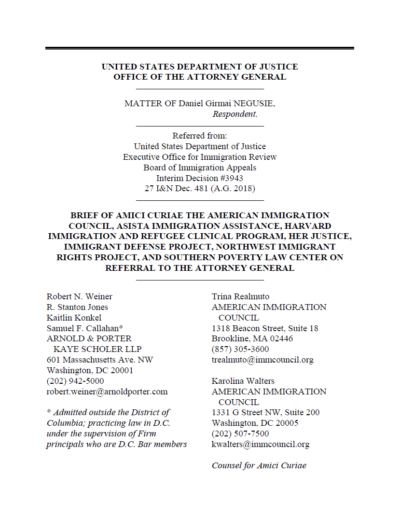Due Process and the Courts
What does the constitution say about due process?
The Fifth Amendment to the Constitution says clearly that no person shall be deprived of life, liberty, or property without the due process of law. Note that this says person, not citizen, and over the years the Supreme Court has consistently ruled that the Due Process Clause applies to all people in the United States.Do non-citizens have the right to due process in the U.S.?
Yes. The Constitution guarantees due process rights to all "persons," not just citizens. This means non-citizens, including undocumented immigrants, are entitled to fair treatment under the law. This includes the right to defend themselves in court. But recent Trump administration policies that speed up deportations and limit access to legal representation make it harder for non-citizens to get their fair day in court.- Access to legal representation Access to legal counsel is an essential part of our justice system and our democracy. In the criminal justice system, anyone facing even one day in jail gets a lawyer if they can't afford one. But immigrants facing deportation usually don't get that chance.The research is clear – the most effective way to ensure some level of due process for people navigating our complicated immigration system is for them to have trained attorney at their side. But Trump administration is now working to strip attorneys from as many people as possible, all in the name of increasing its deportation numbers. This attempt to eliminate basic due process will hurt people who already have few options.
- Fair day in court Due process guarantees that individuals have the opportunity to defend themselves in court. This includes non-citizens facing deportation.
Why is due process important?
We are seeing right now the importance of due process when it comes to President Trump's actions to carry out the so-called Alien Enemies Act, a 1798 wartime law that permits people to be deported outside of the normal framework of immigration law. President Trump has alleged that this law allows him to simply point at any person, declare them to be an alien enemy, and kick them out of the country without ever having a chance to see a judge. Thankfully, the Supreme Court said that is not true, and in a unanimous decision, ruled that people can challenge the Trump administration's invocation of the Alien Enemies Act. That is why due process is so important, because it means that no person can be rounded up and sent to another country without a chance to go to court and make the government prove their case.How is the American Immigration Council working to protect due process?
- We serve thousands of individuals in immigration detention centers through the Immigration Justice Campaign, our initiative with the American Immigration Lawyers Association. The Justice Campaign provides free legal services for immigrants who would otherwise have to navigate our complicated immigration system without a lawyer.
- We use the courts to demand a fair process for immigrants. Our litigation team is fighting back against the Trump administration’s blatant disregard for due process including filing a lawsuit challenging their illegal detention of immigrants in El Salvador’s notorious Terrorism Confinement Center (CECOT).

Federal Court Orders that Asylum Seekers Can Move Forward Challenging Delays
A federal district court in Seattle, Washington issued an order rejecting the government’s arguments that recent asylum seekers who enter the United States without immigration status are not entitled to constitutional protections. Read More

Acting AG Matthew G. Whitaker Lacks Authority to Decide Immigration Case, Say Immigration Groups
The American Immigration Council and other immigrant rights organizations filed a legal brief on Friday that explains why President Donald Trump’s designation of Matthew G. Whitaker as acting attorney general is unlawful. As a result, the brief asserts, Whitaker lacks the authority to decide a critical immigration case. Read More

Matter of Negusie
In Matter of Negusie, former Attorney General Jeff Sessions referred to himself the question of whether coercion and duress are relevant to the application of the immigration statute’s persecutor bar for individuals seeking asylum or withholding of removal Read More

No One Should Face the Immigration System Alone: The American Immigration Council Highlights the Critical Need for Access to an Attorney for #GivingTuesday Campaign
The American Immigration Council announced today that it will focus on the critical need for access to an attorney when navigating the immigration system during its #GivingTuesday and year-end fundraising campaign starting November 27. Read More

DACA Is Still in Effect as It Heads to the Supreme Court
The Ninth Circuit Court of Appeals issued a stinging rebuke to President Trump’s ongoing efforts to end the Deferred Action for Childhood Arrivals (DACA) initiative last week, unanimously upholding a lower court injunction which had blocked the Trump administration from ending the program. Just three days before that hearing,… Read More

The Government Outlines Its Plan to Extend TPS Benefits Under Court Order
In early October, a federal court ruled that the Trump administration had violated the law when it terminated Temporary Protected Status (TPS) for individuals from El Salvador, Haiti, Nicaragua, and Sudan. After weeks of negotiation with the ACLU, which brought the lawsuit, the government has now come forward… Read More
Make a contribution
Make a direct impact on the lives of immigrants.




